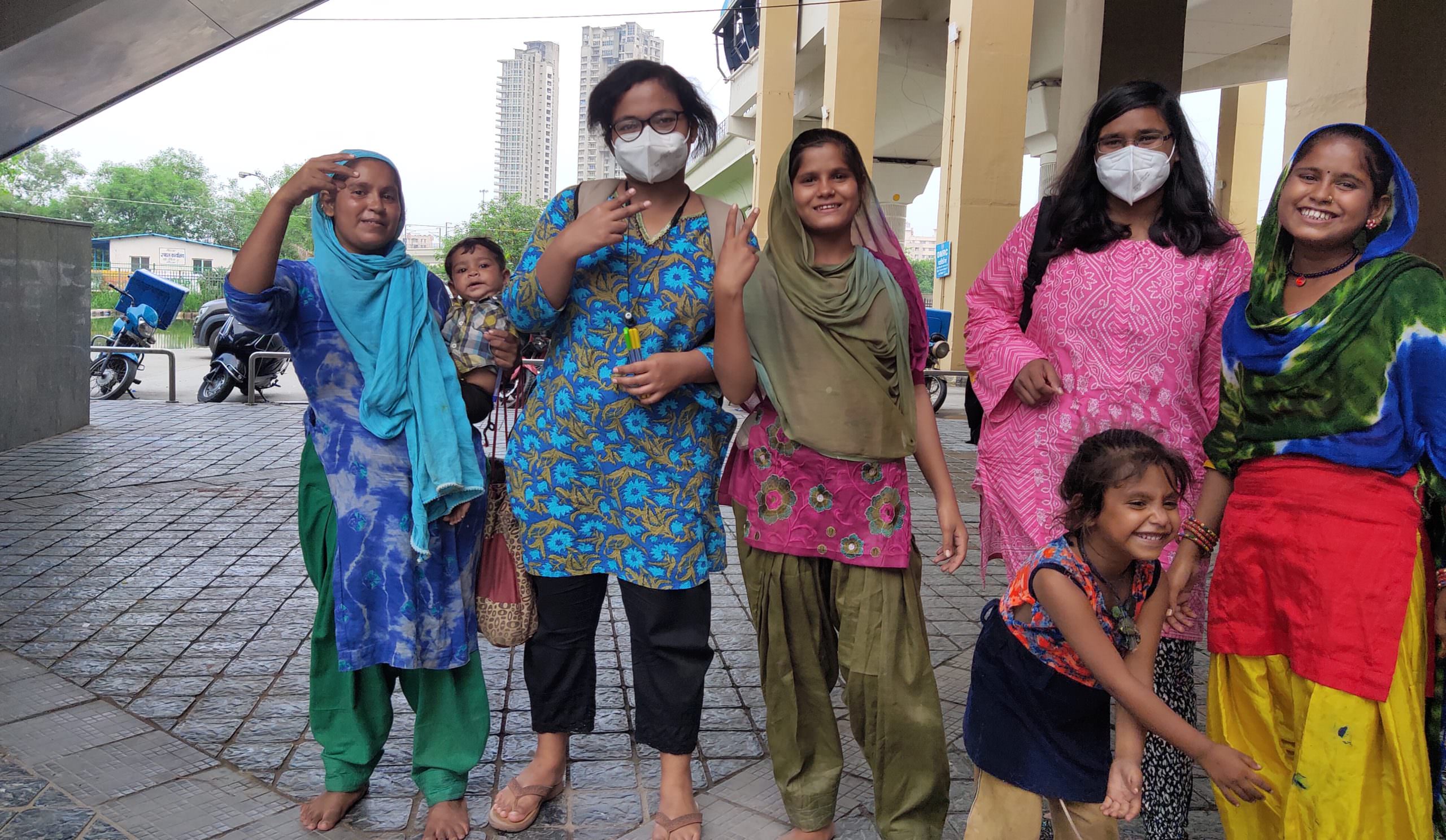
Ronak Jain tries to understand the public’s motivations for and consequences of their beliefs on their actions and outcomes. Photo by Koushik Das.
Ronak Jain, a Mittal Institute Graduate Student Associate, is a 4th year Ph.D. student in Economics at Harvard University. Her research interests lie at the intersection of economic development and behavioral economics. Her work seeks to understand how beliefs and preferences shape economic and psychological outcomes of individuals and communities, with a regional focus on South Asia. She is a former Harvard Kennedy Scholar. She also serves as a Resident Advisor for Graduate Students in the GSAS Residence Halls at Harvard.
The Mittal Institute spoke with Ronak about her research interest and what motivates her.
Mittal Institute: Ronak, thank you for speaking with us! You did your undergraduate at the University of Cambridge and earned a Master’s from the University of Oxford. What drew you across the pond to Harvard?
Ronak Jain: Thanks for inviting me! I was motivated to come to the US for two reasons. The first reason was while earning my M.Phil, I became very passionate about exploring the field of development economics more deeply, and I decided I wanted to become an academic economist. I still remember that I was far from sure that I wanted to come to the US for my Ph.D. and only toyed with the idea as a mere possibility at first, especially knowing that it would be a much longer time commitment (6 years compared to the typical 3-4 in the UK). It was really my thesis advisor at the time, Prof. Margaret Meyer, who encouraged and helped me consider it seriously by linking me to former students of hers to learn more about what a Ph.D in the US offered. It was after learning about the rigor of the Ph.D programs here, the professional training and network that a place like Harvard offers, along with the many grant opportunities that are essential for conducting fieldwork as a development economist, that I decided to make it across the Atlantic.

Ronak Jain, Mittal Institute Graduate Student Associate.
My second reason was a more personal one – I wanted to push myself out of my comfort zone and get exposure to how things worked in other parts of the world. This is not to say that I wasn’t anxious or torn about how it would all pan out, but I knew that I wanted to give it a shot! Plus, getting a fully-funded place at Harvard is like a dream come true for any student, and I definitely wasn’t going to let the opportunity pass!
Mittal Institute: You study pressing societal issues through an economic lens. Can you tell us more about your research?
Ronak Jain: Of course! My research, very broadly speaking, focuses on trying to understand the motivations for and consequences of an individual’s beliefs on their actions and outcomes. In particular, in one of my projects with my co-author, Vatsal Khandelwal, I investigate, theoretically and empirically, whether misperceptions about your communities’ willingness to engage in conversations around emotional well-being and mental health might reduce one’s own engagement with these topics. Working with a very low-income population of waste pickers living together in slum communities across Delhi, we find, through a randomized controlled trial, that a simple belief-correcting intervention can increase conversations on these topics and strengthen social and economic ties by making them more willing to participate in savings groups.
In another project in Pakistan with Minahil Asim and Vatsal Khandelwal, I explore whether conveying high teacher expectations to students can motivate them to study harder and engage more. This is especially relevant during a time when student engagement has been low, given the switch to online classes and absence of in-person student-teacher interaction. We were motivated to investigate this idea following the literature in psychology which speaks of self-fulfilling prophecies, i.e., that if a teacher believes in a student, the student will actually perform well and vice-versa. We therefore wondered whether we could leverage high teacher expectations to move the needle on student effort and motivation, and do so at scale. This project is still ongoing, so we’re yet to find out the results!
Mittal Institute: Why do you think is it important to understand the economics behind decision-making, and why did you decide to focus on South Asia?
Ronak Jain: Being able to see the world around me through a simplified yet clear lens was what drew me to economics in the first place. I became fascinated with how simple theoretical concepts and frameworks in economics – and behavioral economics more recently – can help rationalize so much of our everyday human interactions and outcomes we see around us. As to why I feel it’s important to understand the economics behind decision making, it’s because it helps us link how an individual’s circumstances and constraints shape choices that may determine not only their current situation, but also their future trajectory. By doing so, it really offers us an opportunity to ask and conceptualize a counterfactual world, where we ask could we in some way improve welfare if we were able to relax some constraints or change some circumstance through an intervention.
Just to give a simple stripped-down example, to understand why a parent might send their child to work instead of school, one really needs to understand how this “choice” (or perhaps the absence of it) is related to their financial circumstances or the cost of schooling. Once we know which of the two is the binding constraint, we can better understand whether the appropriate tool here would be to give employment to parents or to reduce the school fees.
As to why I chose to focus on South Asia, it was largely due to feeling confident that I know the context really well, having grown up in India. As a development economist, a lot of the work I hope to do is ultimately aimed at trying to improve the lives of people in whatever miniscule way that we can, and I feel obligated to really know the lives of the people I’m studying and representing in some sense in my work. To do this, I highly value being able to communicate in the same language that my survey participants converse in – Hindi, in this instance. I feel it helps me connect with them at a deeper level and make them feel comfortable sharing their problems and opinions without the fear of being judged or lack of understanding. It also enables me to be able to navigate my way around the places independently and much more easily than I would be able to in a less familiar setting.
Mittal Institute: It seems that a lot of your research involves fieldwork. What is the one thing you love the most about it and what is the one thing you don’t?
Ronak Jain: I absolutely love being able to travel and meet people! So that’s the main perk for me working in this field. These interactions often leave me humbled and inspired, and sometimes even puzzled, all at the same time. On the other hand, one of the downsides of fieldwork has been the uncertainty and risks that come with any data collection effort and empirical work. In particular, it is a really slow process and the pandemic only made it much harder, if not impossible, to be in the field. The time it takes to collect data along with how careful you need to be to make sure your surveys are interpreted correctly and are carried out diligently are the trickiest aspects of fieldwork. Having to be away from campus and friends for extended periods of time is also something one has to be prepared for. It’s still a very rewarding experience in the end!

Ronak, who conducted fieldwork in Delhi last summer, says meeting people through her data collection is the best part of her job. She met this family two years ago (pre-pandemic) and says it was a delight to see them again, after such a difficult time in India.
Mittal Institute: You have conducted some of your fieldwork at the Mittal Institute’s Delhi office. How has the Mittal Institute contributed to your research?
Ronak Jain: I had the opportunity to visit the Mittal Institute Office last summer. I was trying to scope out and learn more about the schooling and work profiles of street children, and the problems they face. When I visited, I was warmly greeted by Sanjay Kumar, former India Country Director of the Mittal Institute. Sanjay kindly helped facilitate my research with connecting me with a number of stakeholders whom I could bounce research ideas off of and learn more about the policy context. It’s also very convenient to have the office in such a central location and I am definitely looking forward to use the desk space and meeting space whenever I’m next back in Delhi for my research. Aside from this, in being part of the Mittal Institute I have valued the opportunity to discuss ideas with students from other schools and disciplinary fields. It’s very interesting to learn about how they think about certain issues and approach to study them. It’s been a nice community to bounce off ideas with about how to deal with some bottlenecks during fieldwork as a number of them have also been researching in South Asia.
Mittal Institute: What are your career aspirations upon graduation?
Ronak Jain: Ah, that’s the really big question! As of now, I’m still committed to a career in academia. Over the last few years, I’ve definitely wavered and considered what a non-academic career would look like; however, I have always found myself drawn to the complete autonomy in terms of being able to research on things you care about or find intellectually stimulating that an academic career provides. Many of my academic supervisors have also been my mentors and inspirations in life, so that’s another thing that keeps me tied to this journey.
